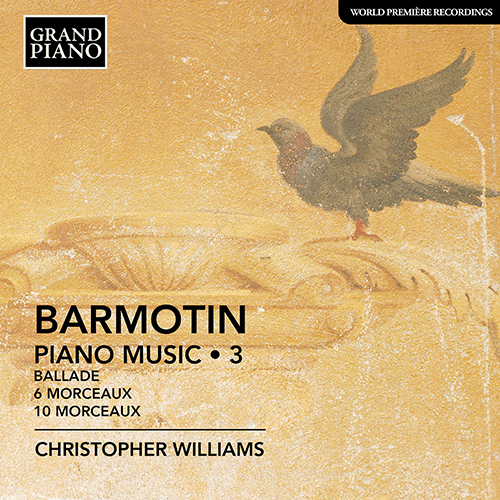
About this Release
“Volume 3 brings together the remaining published piano works of Semyon Barmotin, and introduces us to one of his most dramatic and monumental pieces, the Op.10 “Ballade”. Epic in structure and a pianistic tour de force, this remarkable piece starts with a dark and brooding opening, which gives the story a rather foreboding prologue. Eventually the tension eases, and the listener is taken on an emotional roller-coaster full of romance, heroic virtuosity and unrelenting intensity. As a pianist (and surfer!), one of the highlights is the stormy middle section where Barmotin creates waves of sound by alternating fiendish runs between the hands, which ebb and flow up and down the keyboard. In contrast to the colossus that is the Ballade, the Op.5 and Op.6 sets of pieces show Barmotin at his most concise, with a series of piano miniatures; evocative and yet substantial character pieces. The glittering Valse capricieuse transports us directly to a magical Ball with a beautifully crafted waltz sequence. The Mazurka rustique is wonderfully Russian in flavour, and the finale of the album, the Valse-Scherzo, is a whirlwind of colour.” — Christopher Williams
BARMOTIN, SEMYON (1877–1939)
Piano Music • 3
- Christopher Williams, piano
A student of Rimsky-Korsakov and Balakirev and a contemporary of Stravinsky and Rachmaninov, Semyon Alexeyevich Barmotin (1877–1939) flourished in the years before the Russian Revolution. His was probably the first Ballade for solo piano written by a Russian composer and this large-scale work exemplifies his perfect control of expansive form, Lisztian virtuosic impulse and thematic variety. The two sets of Morceaux enshrine other essential elements of his art – folkloric influences, crystalline sonorities and true expressive depth. Christopher Williams’ third instalment in this acclaimed cycle features all world première recordings.
Tracklist
|
1
Ballade in B-Flat Minor, Op. 10 () (00:17:31)
|
|
6 Morceaux, Op. 5 () (00:22:00 )
|
|
2
No. 1. Pastorale (00:02:50)
|
|
3
No. 2. Minuetto (00:04:26)
|
|
4
No. 3. Berceuse (00:03:00)
|
|
5
No. 4. Valse mélancolique (00:02:54)
|
|
6
No. 5. Leggenda (00:05:44)
|
|
7
No. 6. Mazurka rustique (00:03:02)
|
|
10 Morceaux, Op. 6 () (00:34:00 )
|
|
8
No. 1. Intermezzo (00:07:36)
|
|
9
No. 2. Pastorale norvégienne (00:02:22)
|
|
10
No. 3. Prélude (00:02:11)
|
|
11
No. 4. Chant du Nord (00:01:22)
|
|
12
No. 5. La Coquetterie (00:02:39)
|
|
13
No. 6. Valse capricieuse (00:04:54)
|
|
14
No. 7. Élégie (00:04:57)
|
|
15
No. 8. Prélude (00:01:32)
|
|
16
No. 9. Rêverie (00:01:48)
|
|
17
No. 10. Valse-Scherzo (00:04:31)
|
The Artist(s)
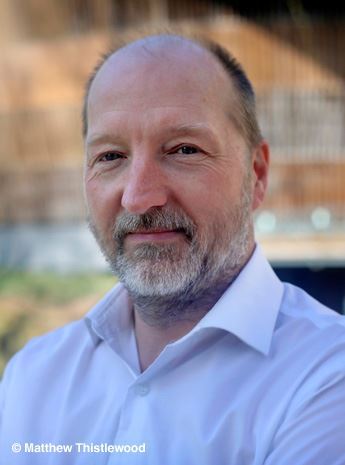 Christopher Williams is a music graduate of Cardiff University and now leads a busy and varied professional life as a pianist, composer, conductor, teacher and arranger. He is currently assistant director of the BBC National Chorus of Wales and is a pianist for the BBC National Orchestra of Wales, with whom he has performed at the BBC Proms and recorded for the Chandos and Hyperion labels. In addition to his work as a soloist, Williams is in great demand as an accompanist and chamber musician, and has partnered many of the prominent instrumentalists of his generation including Philippe Schartz, Tim Thorpe, David Childs, David Pyatt and Tine Thing Helseth. He has also appeared on BBC TV and been broadcast on BBC Radio and Radio Luxembourg. His recording of Brahms transcriptions for Grand Piano was featured as album of the week on NDR Kultur.
Christopher Williams is a music graduate of Cardiff University and now leads a busy and varied professional life as a pianist, composer, conductor, teacher and arranger. He is currently assistant director of the BBC National Chorus of Wales and is a pianist for the BBC National Orchestra of Wales, with whom he has performed at the BBC Proms and recorded for the Chandos and Hyperion labels. In addition to his work as a soloist, Williams is in great demand as an accompanist and chamber musician, and has partnered many of the prominent instrumentalists of his generation including Philippe Schartz, Tim Thorpe, David Childs, David Pyatt and Tine Thing Helseth. He has also appeared on BBC TV and been broadcast on BBC Radio and Radio Luxembourg. His recording of Brahms transcriptions for Grand Piano was featured as album of the week on NDR Kultur. The Composer(s)
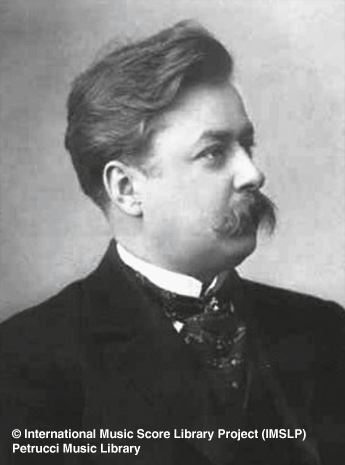 Particularly notable among Semyon Alexeyevich Barmotin’s later works is the Poème symphonique, Op. 30, written in 1930 and dedicated to the memory of his teacher Balakirev, who had died 20 years earlier. Barmotin’s other surviving works include several occasional pieces that reflect the tumultuous period through which he lived, such as the Hymn to Comrade Stalin (1936) and October Victory, a march-cantata to celebrate the 20th anniversary of the October Revolution (1937).
Particularly notable among Semyon Alexeyevich Barmotin’s later works is the Poème symphonique, Op. 30, written in 1930 and dedicated to the memory of his teacher Balakirev, who had died 20 years earlier. Barmotin’s other surviving works include several occasional pieces that reflect the tumultuous period through which he lived, such as the Hymn to Comrade Stalin (1936) and October Victory, a march-cantata to celebrate the 20th anniversary of the October Revolution (1937). 
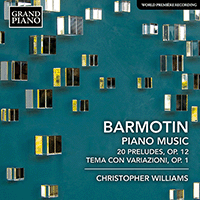
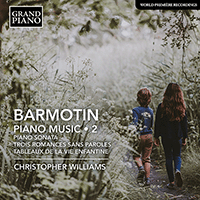
 Grand Piano has gained a reputation for producing high quality recordings of rare keyboard gems. Dedicated to the exploration of undiscovered piano repertoire, the label specialises in complete cycles of piano works by many lesser-known composers, whose output might otherwise have remained unknown and unrecorded.
Grand Piano has gained a reputation for producing high quality recordings of rare keyboard gems. Dedicated to the exploration of undiscovered piano repertoire, the label specialises in complete cycles of piano works by many lesser-known composers, whose output might otherwise have remained unknown and unrecorded.






